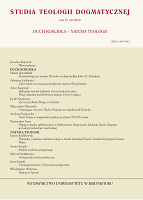DUSZA LUDZKA STWORZONA NA OBRAZ I PODOBIEŃSTWO BOGA.REFLEKSJA NA PODSTAWIE KAZAŃ 80, 81 ORAZ 82 Z SERII KAZAŃ O PIEŚNI NAD PIEŚNIAMI ŚWIĘTEGO BERNARDA Z CLAIRVAUX
THE HUMAN SOUL CREATED IN THE IMAGE AND LIKENESS OF GOD. REFLECTIONS BASED ON SERMONS 80, 81, AND 82 FROM THE SERIES OF SERMONS ON THE SONG OF SONGS BY SAINT BERNARD OF CLAIRVAUX
Author(s): Marek ChojnackiSubject(s): Christian Theology and Religion, Systematic Theology
Published by: Wydawnictwo Uniwersytetu w Białymstoku
Keywords: Saint Bernard of Clairvaux; monastic theology; creation in image and likeness; human soul; original sin;
Summary/Abstract: The article presents reflections based mainly on three sermons: 80, 81, 82 from the series Super Cantica by Saint Bernard of Clairvaux, a representative of the so-called monastic theology and the twelfth century Renaissance. The Abbot is intrigued by the problem of sin in the life of the Christian community and the evident tendency to commit sins by baptized faithful, endowed with free will. The soul, created in the image and likeness of God, is subject to the fall of original sin. This issue is addressed in two works: De gratia et libero arbitrioand Sermons 80, 81, and 82 on the Song of Songs. The issues are interpreted differently in these works, although the medieval author pointed out that they were: “different (...), but not opposing”.The main source for the article is the critical edition of the saint’s works: Sancti Bernardi opera omnia, vol. I-VIII, Recensuerunt J. Leclercq, H. Rochais, C.H Talbot, Romae 1957-1977. In the Sermons on the Song of Songs, the thought is expressed that man, after original sin, loses integrity, that is, nobility as simplicity (rectitudo), while greatness (magnitudo) remains. It can be said that the soul retains greatness, that is, among other things, immortality, and its vocation to eternal life with God. The likeness to God is indestructible, but it can be darkened, or covered with a “cloak”. The effect of original sin is a soul that tends to the low and earthly things, but that is constantly looking for something that leads to God. The will becomes the slave of sin. The common thought of the two doctrines is expressed in the greatness of man created in the image of God (or the Word); a greatness that can be in the freedom or ability that man has for God. There is also a similarity (similitudo), which in the first doctrine is destroyed but recoverable; in the second doctrine it is darkened by a form of “covering dissimilarity”. Only The Lord, by His grace, leads man on the way back to the Father.
Journal: Studia Teologii Dogmatycznej
- Issue Year: 2021
- Issue No: 7
- Page Range: 43-60
- Page Count: 18
- Language: Polish

